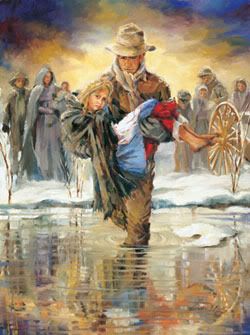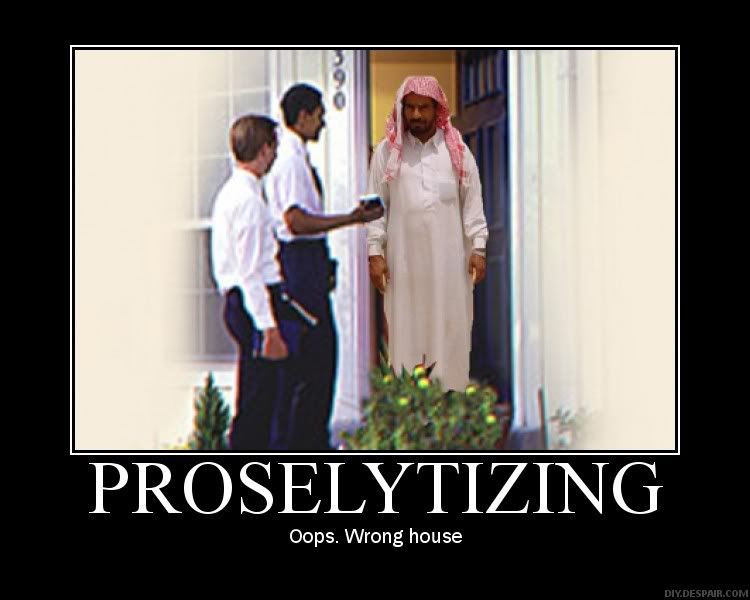Even for the limited success there are lots of problems and discontent among individuals in these groups. Unfortunately due to the mishandling of the property of former members that are thrown out of such groups legal contentions have splintered their assets. The Lord told the Saints in revelation that the Lord would not allow the principle to be lived fully until Zion is redeemed. Personally I think the Lord will reveal a way that if a person puts in their assets they can recover them later. That is the flaw in their current attempts.
They say that timing is everything. The law of consecration which is tied up in the United Order has been put on hold until the Saints redeem Zion. Zion is defined by us as Jackson County, Missouri and particularly the Temple Lot that is owned by the Church of Christ (Temple Lot). Unfortunately this group has never had much success and has about six thousand members so they aren't exactly converting thousands. The LDS Church has its eye on acquiring the site and is waiting in the wings for the day when the Lord opens the way for Zion to be redeemed and then the law of consecration will be established by the Savior who will come in the last days.
There have been communal attempts by all the various groups of Saints. In the days of Brigham Young they made attempts at cooperatives and attempted living the United Order but they quickly learned that due to the nature of men and women that such efforts were not usually successful and we are now living the lesser law.
In the case of the United Order there is a tendency on the part of the leaders of any religious group to misuse their power that is where the breakdown occurs. It has come to my attention that even among fundamentalist groups that who holds and retains property is determined by leaders who frankly grab land and property and wives. The problem occurs when a person is tossed out for supposedly not being worthy. I find it fascinating that they are clueless when the federal government comes in and says wait a minute you violated the former person's rights.
If in their capricious opinion a man no longer is worthy they just throw him out of his wife and strip him of his wives and children and residences and give it to themselves or friends. Many times it is due to the greed of such men who are controlling and frankly have lost their priesthood due to unrighteous behavior. Only God knows the heart of men and women and I suspect there are several cases where the seizures are frankly unrighteous. God saved wicked cities and people when there were a few righteous.
The Lord was smart enough to know that most men can not handle communal property rights without treading on the rights of others in a unrighteous manner from time to time. Hence in Section 105 the Lord tells Joseph Smith that Zion will have to wait until the Latter-day Saints redeem Jackson County which will be after the Lord comes in the millennium.
I have not seen any group including the fundamentalists redeem Jackson County yet. They have few compounds that come close but unfortunately they do something stupid that brings the state or federal government down on them. Joseph Smith was smart enough to have the Lord tell him the state of the future. The FLDS seem to build Zion in Texas, Arizona and Utah rather than Missouri. In fact no group including our own has redeemed Zion. Let me reiterate the Law of Consecration won't be realized until Zion is redeemed.
For the last several decades all the groups have been marking time. All the players are poised around the area but none has had success in converting the gentiles. The Community of Christ (RLDS Church) has their site. The Church of Christ (Temple Lot) keeps the other groups from getting the temple lot. None of these groups has redeemed Zion in any fashion. The LDS Church has a sizeable group of members and a visitor's center but nothing spectacular has happened in Jackson County. We did pick up the farm next to Adam-ondi-Ahman but alas none of these groups has redeemed Zion. The United Order and the law of consecration as well as Zion are on hold. Only the Lord himself will redeem Zion when he is good and ready which is not now.
Marion G. Romney in April Conference 1966 gave the LDS General Authorities' perspective on how the United Order has been modified today within the Church:
The final words of the Lord in suspending the order were: "And let those commandments which I have given concerning Zion and her law be executed and fulfilled, after her redemption." (D&C 105:34.) Further implementation of the order must therefore await the redemption of Zion. Here Zion means Jackson County, Missouri. When Zion is redeemed, as it most certainly shall be, it will be redeemed under a government and by a people strictly observing those "just and holy principles" of the Constitution that accord to men their God-given moral agency, including the right to private property. If, in the meantime, socialism takes over in America, it will have to be displaced, if need be, by the power of God, because the United Order can never function under socialism or "the welfare state," for the good and sufficient reason that the principles upon which socialism and the United Order are conceived and operated are inimical. In the meantime, while we await the redemption of Zion and the earth and the establishment of the United Order, we as bearers of the priesthood should live strictly by the principles of the United Order insofar as they are embodied in present church practices, such as the fast offering, tithing, and the welfare activities. Through these practices we could as individuals, if we were of a mind to do so, implement in our own lives all the basic principles of the United Order.
As you will recall, the principles underlying the United Order are consecration and stewardships and then the contribution of surpluses into the bishop's storehouse. When the law of tithing was instituted four years after the United Order experiment was suspended, the Lord required the people to put "all their surplus property . . . into the hands of the bishop" (D&C 119:1); thereafter they were to "pay one-tenth of all their interest annually. . . ." (D&C 119:4.) This law, still in force, implements to a degree at least the United Order principle of stewardships, for it leaves in the hands of each person the ownership and management of the property from which he produces the needs of himself and family. Furthermore to use again the words of President Clark: ". . . in lieu of residues and surpluses which were accumulated and built up under the United Order, we, today, have our fast offerings, our Welfare donations, and our tithing all of which may be devoted to the care of the poor, as well as for the carrying on of the activities and business of the Church." What prohibits us from giving as much in fast offerings as we would have given in surpluses under the United Order? Nothing but our own limitations.
Furthermore, we had under the United Order a bishop's storehouse in which were collected the materials from which to supply the needs and the wants of the poor. We have a bishop's storehouse under the Welfare Plan, used for the same purpose. . . . "We have now under the Welfare Plan all over the Church, . . . land projects . . . farmed for the benefit of the poor. . . . "Thus . . . in many of its great essentials, we have, [in] the Welfare Plan . . . the broad essentials of the United Order. Furthermore, having in mind the assistance which is being given from time to time . . . to help set people up in business or in farming, we have a plan which is not essentially unlike that which was in the United Order when the poor were given portions from the common fund."
It is thus apparent that when the principles of tithing and the fast are properly observed and the Welfare Plan gets fully developed and wholly into operation, "we shall not be so very far from carrying out the great fundamentals of the United Order." (Conference Report, October 1942, pp. 51-58.) The only limitation on you and me is within ourselves. A Prayer: And now in line with these remarks for three things I pray:
- That the Lord will somehow quicken our understanding of the differences between socialism and the United Order and give us a vivid awareness of the awful portent of those differences.
- That we will develop the understanding, the desire, and the courage born of the Spirit, to eschew socialism and to support and sustain, in the manner revealed and as interpreted by the Lord, those just and holy principles embodied in the Constitution of the United States for the protection of all flesh, in the exercise of their God-given agency.
- That through faithful observance of the principles of tithing, the fast, and the welfare program, we will prepare ourselves to redeem Zion and ultimately live the United Order, in the name of Jesus Christ. Amen.
Marion Romney was smart enough to realize that you can't strip away the agency of those involved in the practice. It takes a righteous group to live the law of consecration. If you want to live the law of consecration in my opinion you need to work within the organization to convert a group of people who are so righteous they would be able to usher in the second coming.
None of the bozos I read about in any of these splinter groups make me want to run off and join them. They would steal my wife and children take my money and property and discard me like a piece of rubbish. They would cloak their supposed treatment as I am unworthy when it is really just their need for power and covetousness which is a sin. Me I will do all in my power to usher in Christ's second coming and stick with the good ship Zion (LDS). If I am to be tossed out let he who knows our heart and deeds make the determination because there is no man on this earth capable of that or the Lord wouldn't have told Joseph what he did in Section 105 and that included Joseph Smith who was not ready to institute consecration. If Joseph Smith wasn't ready why do a bunch of lesser men think they can do it?
The Lord didn't say to redeem Utah, Arizona, Texas, or any other place than Zion which the Prophet Joseph defined as the New Jerusalem in Jackson County, Missouri. All these groups better get their butts over to Missouri and start building up Zion. The LDS Church has a better shot than any of these other groups because we are working there to position ourselves when the Savior comes again.














